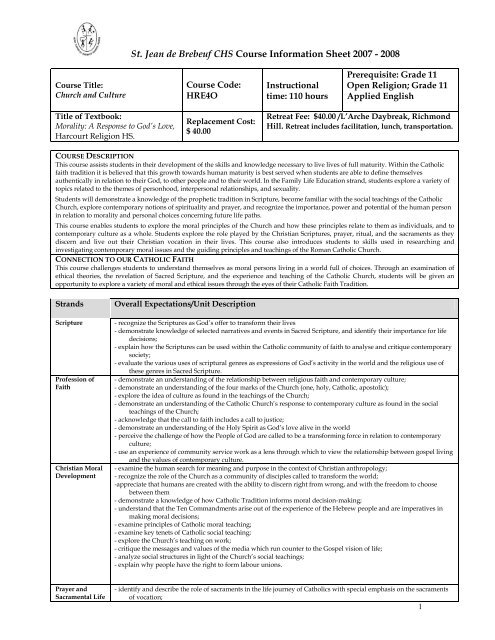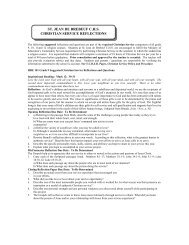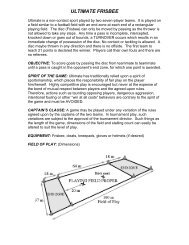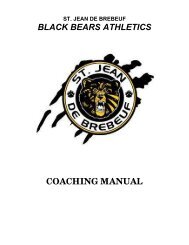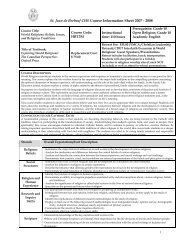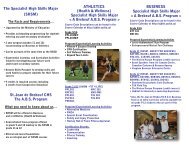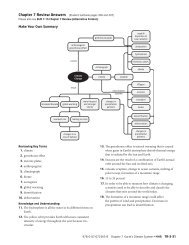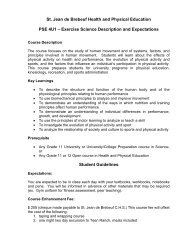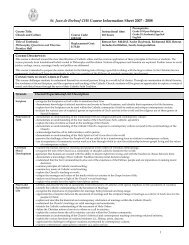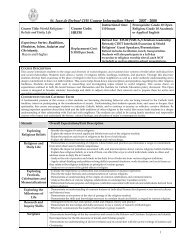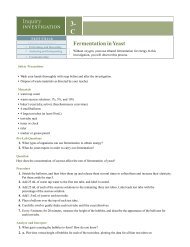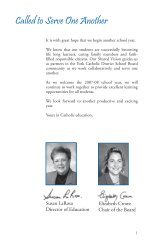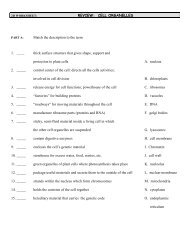HRE40 07 08.pdf - St Jean de Brebeuf
HRE40 07 08.pdf - St Jean de Brebeuf
HRE40 07 08.pdf - St Jean de Brebeuf
You also want an ePaper? Increase the reach of your titles
YUMPU automatically turns print PDFs into web optimized ePapers that Google loves.
<strong>St</strong>. <strong>Jean</strong> <strong>de</strong> <strong>Brebeuf</strong> CHS Course Information Sheet 20<strong>07</strong> - 2008<br />
Course Title:<br />
Church and Culture<br />
Course Co<strong>de</strong>:<br />
HRE4O<br />
Instructional<br />
time: 110 hours<br />
Prerequisite: Gra<strong>de</strong> 11<br />
Open Religion; Gra<strong>de</strong> 11<br />
Applied English<br />
Title of Textbook:<br />
Morality: A Response to God’s Love,<br />
Harcourt Religion HS.<br />
Replacement Cost:<br />
$ 40.00<br />
Retreat Fee: $40.00 /L’Arche Daybreak, Richmond<br />
Hill. Retreat inclu<strong>de</strong>s facilitation, lunch, transportation.<br />
COURSE DESCRIPTION<br />
This course assists stu<strong>de</strong>nts in their <strong>de</strong>velopment of the skills and knowledge necessary to live lives of full maturity. Within the Catholic<br />
faith tradition it is believed that this growth towards human maturity is best served when stu<strong>de</strong>nts are able to <strong>de</strong>fine themselves<br />
authentically in relation to their God, to other people and to their world. In the Family Life Education strand, stu<strong>de</strong>nts explore a variety of<br />
topics related to the themes of personhood, interpersonal relationships, and sexuality.<br />
<strong>St</strong>u<strong>de</strong>nts will <strong>de</strong>monstrate a knowledge of the prophetic tradition in Scripture, become familiar with the social teachings of the Catholic<br />
Church, explore contemporary notions of spirituality and prayer, and recognize the importance, power and potential of the human person<br />
in relation to morality and personal choices concerning future life paths.<br />
This course enables stu<strong>de</strong>nts to explore the moral principles of the Church and how these principles relate to them as individuals, and to<br />
contemporary culture as a whole. <strong>St</strong>u<strong>de</strong>nts explore the role played by the Christian Scriptures, prayer, ritual, and the sacraments as they<br />
discern and live out their Christian vocation in their lives. This course also introduces stu<strong>de</strong>nts to skills used in researching and<br />
investigating contemporary moral issues and the guiding principles and teachings of the Roman Catholic Church.<br />
CONNECTION TO OUR CATHOLIC FAITH<br />
This course challenges stu<strong>de</strong>nts to un<strong>de</strong>rstand themselves as moral persons living in a world full of choices. Through an examination of<br />
ethical theories, the revelation of Sacred Scripture, and the experience and teaching of the Catholic Church, stu<strong>de</strong>nts will be given an<br />
opportunity to explore a variety of moral and ethical issues through the eyes of their Catholic Faith Tradition.<br />
<strong>St</strong>rands<br />
Scripture<br />
Profession of<br />
Faith<br />
Christian Moral<br />
Development<br />
Overall Expectations/Unit Description<br />
- recognize the Scriptures as God’s offer to transform their lives<br />
- <strong>de</strong>monstrate knowledge of selected narratives and events in Sacred Scripture, and i<strong>de</strong>ntify their importance for life<br />
<strong>de</strong>cisions;<br />
- explain how the Scriptures can be used within the Catholic community of faith to analyse and critique contemporary<br />
society;<br />
- evaluate the various uses of scriptural genres as expressions of God’s activity in the world and the religious use of<br />
these genres in Sacred Scripture.<br />
- <strong>de</strong>monstrate an un<strong>de</strong>rstanding of the relationship between religious faith and contemporary culture;<br />
- <strong>de</strong>monstrate an un<strong>de</strong>rstanding of the four marks of the Church (one, holy, Catholic, apostolic);<br />
- explore the i<strong>de</strong>a of culture as found in the teachings of the Church;<br />
- <strong>de</strong>monstrate an un<strong>de</strong>rstanding of the Catholic Church’s response to contemporary culture as found in the social<br />
teachings of the Church;<br />
- acknowledge that the call to faith inclu<strong>de</strong>s a call to justice;<br />
- <strong>de</strong>monstrate an un<strong>de</strong>rstanding of the Holy Spirit as God’s love alive in the world<br />
- perceive the challenge of how the People of God are called to be a transforming force in relation to contemporary<br />
culture;<br />
- use an experience of community service work as a lens through which to view the relationship between gospel living<br />
and the values of contemporary culture.<br />
- examine the human search for meaning and purpose in the context of Christian anthropology;<br />
- recognize the role of the Church as a community of disciples called to transform the world;<br />
-appreciate that humans are created with the ability to discern right from wrong, and with the freedom to choose<br />
between them<br />
- <strong>de</strong>monstrate a knowledge of how Catholic Tradition informs moral <strong>de</strong>cision-making;<br />
- un<strong>de</strong>rstand that the Ten Commandments arise out of the experience of the Hebrew people and are imperatives in<br />
making moral <strong>de</strong>cisions;<br />
- examine principles of Catholic moral teaching;<br />
- examine key tenets of Catholic social teaching;<br />
- explore the Church’s teaching on work;<br />
- critique the messages and values of the media which run counter to the Gospel vision of life;<br />
- analyze social structures in light of the Church’s social teachings;<br />
- explain why people have the right to form labour unions.<br />
Prayer and<br />
Sacramental Life<br />
- i<strong>de</strong>ntify and <strong>de</strong>scribe the role of sacraments in the life journey of Catholics with special emphasis on the sacraments<br />
of vocation;<br />
1
Family Life<br />
Education<br />
- i<strong>de</strong>ntify the Catholic un<strong>de</strong>rstanding of the Sacrament of Marriage<br />
- recognize the importance of preparation for marriage, both proximate and long-range;<br />
- appreciate the connection between the sacrament of marriage and the scriptural image of marriage as a mirror of<br />
God’s love for his people in Christ;<br />
- explain and <strong>de</strong>scribe the historical and contemporary celebration of marriage within the Catholic Church;<br />
- un<strong>de</strong>rstand the Church’s teachings on valid marriages and annulments;<br />
- i<strong>de</strong>ntify the Catholic un<strong>de</strong>rstanding of the sacrament of Holy Or<strong>de</strong>rs<br />
- <strong>de</strong>fine the Christian notion of service to others as a call to ministry;<br />
- explain the various forms the call to ministry can take within the Christian community;<br />
- <strong>de</strong>monstrate an un<strong>de</strong>rstanding of the Church’s historical and contemporary teaching concerning ordained ministry;<br />
- explain the various functions of ordained ministers (i.e., bishop, priest, <strong>de</strong>acon);<br />
- appreciate the challenge to religious vocations as presented by contemporary culture;<br />
- examine contemporary approaches to ministry as a call to service<br />
- examine the meaning and value of human freedom and commitment, values and conscience and personal and social<br />
responsibility in light of the Catholic faith tradition;<br />
- <strong>de</strong>scribe and analyse the stages of the human life cycle with particular attention to moral <strong>de</strong>velopment;<br />
- <strong>de</strong>scribe and discuss emotional balance; i<strong>de</strong>ntify signs of imbalance that require intervention, and sources of help;<br />
- discern essential components for building healthy intimate relationships (e.g., family, friendships, romantic<br />
relationships, etc.) in their lives, and examine the ways in which all relationships influence human growth;<br />
- explore and interpret the relationship between the family and society; examine challenges to family life such as<br />
illness, crisis and abuse;<br />
- examine the role of chastity in the expression of sexuality in relationships and marriage;<br />
- examine issues related to sexual attraction and sexual <strong>de</strong>cision-making (chastity, love, marriage, pre-marital<br />
relationships, pregnancy, abortion, adoption, cohabitation);<br />
- <strong>de</strong>monstrate an un<strong>de</strong>rstanding of the Church’s teaching of the sacredness of human life from conception to natural<br />
<strong>de</strong>ath;<br />
- <strong>de</strong>monstrate an un<strong>de</strong>rstanding and profound respect for the sacred gift of human procreation, the gift of children,<br />
the experience of parenting;<br />
- examine issues of fertility/infertility, reproductive technology, and STD’s as one cause of infertility;<br />
- <strong>de</strong>monstrate an un<strong>de</strong>rstanding and an appreciation of the role Church encyclicals play in providing teaching and<br />
guidance in Family Life issues.<br />
Part 1: Foundations of Catholic Morality<br />
Part 2: Catholic Morality Applied<br />
Chapter1: Morality: A Call to Catholic Morality<br />
Chapter 2: Jesus: Mo<strong>de</strong>l of Morality<br />
Chapter 3: The Church<br />
Chapter 4: Conscience: Being True to Ourselves<br />
Chapter 5: Sin and Morality<br />
Chapter 6: The Virtues: Cultivating Character<br />
Chapter 7: Moral Decision Making<br />
Chapter 8: The Decalogue: Taking Care of Our<br />
Relationship with God<br />
Chapter 9: The Family and Beyond<br />
Chapter 10: Cherishing Each Person: Abortion, Euthanasia, and Respect<br />
for Life<br />
Chapter 11: Promoting Peace: Issues of Violence and War<br />
Chapter 12: Sexuality and Morality<br />
Chapter 13: Living the Truth in Love<br />
Chapter 14: Generosity and Justice<br />
Formative Evaluation - 70%<br />
Based on a variety of FORMATIVE evaluations conducted<br />
throughout the course. This portion of the gra<strong>de</strong> reflects<br />
the stu<strong>de</strong>nt’s most consistent level of achievement<br />
throughout the course, although special consi<strong>de</strong>ration is<br />
given to more recent evi<strong>de</strong>nce of achievement.<br />
Assessment and Evaluation Breakdown<br />
Summative Evaluations - 30%<br />
Based on a final evaluation in the form of an examination, performance product,<br />
essay, and/or other method of evaluation suitable to the course content and<br />
administered towards the end of the course.<br />
(Program, Planning and Assessment: The Ontario Curriculum Gra<strong>de</strong>s 9 to 12, p.15).<br />
Knowledge/Un<strong>de</strong>rstanding - 20% Culminating Performance Task(s) – 10%<br />
Thinking - 20%<br />
Communication - 10% Exam – 20%<br />
Application - 20%<br />
Assessment and Evaluation <strong>St</strong>rategies Employed in the Course: A variety of assessment and evaluation<br />
methods will be used including teacher directed lessons, observation, group work, checklists, role playing, hands on activities,<br />
<strong>de</strong>bates, reflection, conferencing, interpretation and analysis of various media (vi<strong>de</strong>os, TV, posters, newspapers),, paragraph and<br />
essay writing, analysis of charts, performance assessment, as well as Unit tests and assignments. Units inclu<strong>de</strong> rubrics, reflection<br />
logs, quizzes, portfolios and a host of other assessment instruments that are i<strong>de</strong>ntified in each unit and in the various activities.<br />
2
Focus on Learning Skills:<br />
Works<br />
In<strong>de</strong>pen<strong>de</strong>ntly<br />
Teamwork Organization Work<br />
Habits/Homework<br />
Follows instructions; Solves problems<br />
Follows specific Follows instructions,<br />
Completes<br />
collaboratively; Contributes i<strong>de</strong>as steps to reach goals; uses time efficiently;<br />
assignments on and information to solve problems Revises strategies when<br />
completes homework<br />
time; Uses time and make <strong>de</strong>cisions; Shows respect necessary; Demonstrates<br />
on time and with care<br />
effectively<br />
for members of the group<br />
ability to organize<br />
and manage<br />
information<br />
Initiative<br />
Attempts a<br />
variety of learning<br />
activities; Requires<br />
little prompting to<br />
complete tasks;<br />
Seeks additional<br />
information in the<br />
various media<br />
Name of Teacher: _______________________________________________<br />
NB: PARENTS/GUARDIANS ARE REQUESTED TO DISCUSS PROGRESS AND ACHIEVEMENT WITH THEIR<br />
DAUGHTER/SON ON A REGULAR BASIS. CONSULT UNIT TESTS, ASSIGNMENTS AND MARK UPDATES<br />
REGULARLY.<br />
CHECK STUDENT AGENDA FOR ASSESSMENT AND EVALUATION POLICIES, MID-SEMESTER REPORTING AND<br />
PARENT-TEACHER INTERVIEWS.<br />
We have reviewed the School Agenda re: the 2006 YCDSB Assessment and Evaluation Policy for Late and/or Missed<br />
Assignments.<br />
<strong>St</strong>u<strong>de</strong>nt Signature Parent/Guardian Signature Date<br />
3


